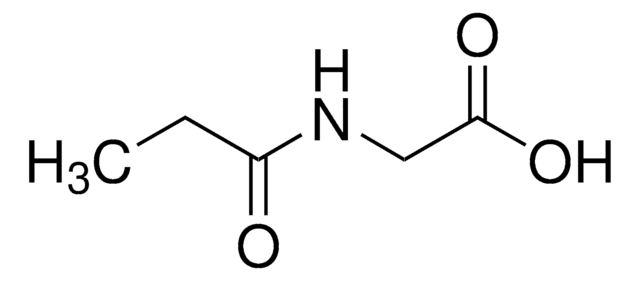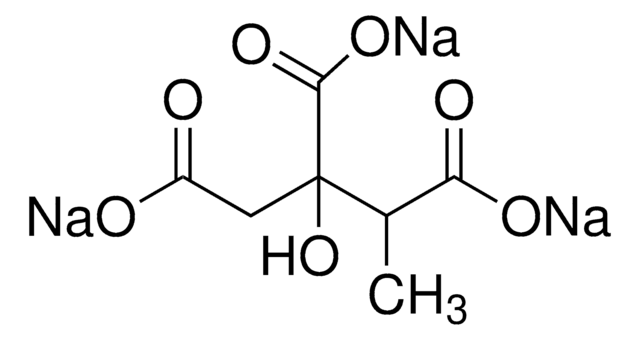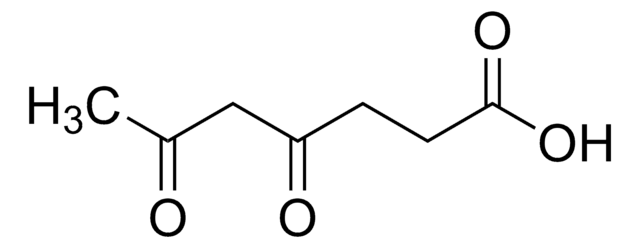04478
N-(2-Methylbutyryl)glycine
analytical standard
Sinonimo/i:
2-Methylbutyryl glycine, N-(2-Methyl-1-oxobutyl)glycine
Autenticatiper visualizzare i prezzi riservati alla tua organizzazione & contrattuali
About This Item
Formula empirica (notazione di Hill):
C7H13NO3
Numero CAS:
Peso molecolare:
159.18
Beilstein:
2206207
Numero MDL:
Codice UNSPSC:
12352209
ID PubChem:
NACRES:
NA.24
Prodotti consigliati
Grado
analytical standard
Livello qualitativo
Saggio
≥98.0% (HPLC)
Durata
limited shelf life, expiry date on the label
applicazioni
clinical testing
Formato
neat
Temperatura di conservazione
2-8°C
InChI
1S/C7H13NO3/c1-3-5(2)7(11)8-4-6(9)10/h5H,3-4H2,1-2H3,(H,8,11)(H,9,10)
HOACIBQKYRHBOW-UHFFFAOYSA-N
Categorie correlate
Azioni biochim/fisiol
2-Methylbutyrylglycine is an acyl glycine. Acyl glycines are normally minor metabolites of fatty acids. However, the excretion of certain acyl glycines is increased in several inborn errors of metabolism. In certain cases the measurement of these metabolites in body fluids can be used to diagnose disorders associated with mitochondrial fatty acid beta-oxidation. Acyl glycines are produced through the action of glycine N-acyltransferase (EC 2.3.1.13) which is an enzyme that catalyzes the chemical reaction:. acyl-CoA + glycine ↔ CoA + N-acylglycine. The isolated excretion of high levels of 2-methylbutyrylglycine (2-MBG) is the hallmark of short/branched-chain acyl-CoA dehydrogenase deficiency or SBCADD. The disorder is also called 2-methylbutyryl-CoA dehydrogenase deficiency and has been associated with autism and mental retardation. SBCADD is a recently described autosomal recessive disorder caused by a defect in the degradation pathway of L- isoleucine leading to increased urinary excretion of 2-methylbutyryl glycine. The enzymatic defect results from disruption of the SBCAD gene. Deficiency of SBCAD leads to accumulation of its substrate, 2-methylbutyryl-CoA within the mitochondrion. This substance is transesterified with glycine by the mitochondrial enzyme acyl-CoA glycine-N-acyltransferase (glycine-N-acylase) to form 2-methylbutyryl glycine. Affected patients can be divided into two categories. The first category consists of infants detected by newborn screening programs. These infants are treated with diet and remain without clinical symptoms. In the second category affected patients are diagnosed because they presented clinically with seizures and psychomotor delay and have increased urinary excretion of 2-methylbutyryl glycine. 2-Methylbutyrylglycine has also been found in the urine of patients with propionyl-CoA carboxylase deficiency after consuming isoleucine. 2-methylbutyrylglycine is also elevated in the urine of patients with glutaric aciduria II and ethylmalonic encephalopathy.
Avvertenze
Warning
Indicazioni di pericolo
Consigli di prudenza
Classi di pericolo
Eye Irrit. 2 - Skin Irrit. 2
Codice della classe di stoccaggio
11 - Combustible Solids
Classe di pericolosità dell'acqua (WGK)
WGK 3
Punto d’infiammabilità (°F)
Not applicable
Punto d’infiammabilità (°C)
Not applicable
Scegli una delle versioni più recenti:
Possiedi già questo prodotto?
I documenti relativi ai prodotti acquistati recentemente sono disponibili nell’Archivio dei documenti.
Oivind J Kanavin et al.
Journal of medical case reports, 1, 98-98 (2007-09-22)
2-methylbutyryl-CoA dehydrogenase deficiency or short/branched chain acyl-CoA dehydrogenase deficiency (SBCADD) is caused by a defect in the degradation pathway of the amino acid L-isoleucine. We report a four-year-old mentally retarded Somali boy with autism and a history of seizures, who
Stanley H Korman et al.
Clinical chemistry, 51(3), 610-617 (2004-12-24)
Isolated excretion of 2-methylbutyrylglycine (2-MBG) is the hallmark of short/branched-chain acyl-CoA dehydrogenase deficiency (SBCADD), a recently identified defect in the proximal pathway of L-isoleucine oxidation. SBCADD might be underdiagnosed because detection and recognition of urine acylglycines is problematic. Excretion of
L Sweetman et al.
Biomedical mass spectrometry, 5(3), 198-207 (1978-03-01)
A number of previously unrecognized abnormal metabolites have been identified and quantitated in the urine of a patient with an inherited deficiency of propionyl-CoA carboxylase. These included the isoleucine metabolites 2-methyl-3-hydroxybutyric acid and 2-methylacetoacetic acid. These isomers 3-hydroxyvaleric acid and
Il team dei nostri ricercatori vanta grande esperienza in tutte le aree della ricerca quali Life Science, scienza dei materiali, sintesi chimica, cromatografia, discipline analitiche, ecc..
Contatta l'Assistenza Tecnica.








